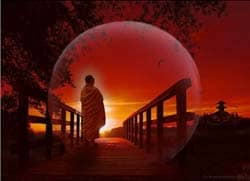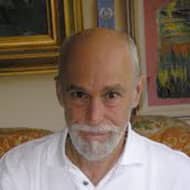By Gary Gach
If there is any religion that would cope with modern scientific needs, it would be Buddhism. ~ Albert Einstein

Science and religion have been uneasy bedfellows, until now. It's interesting to observe how the presence of the Buddha facilitates new bridges between the two. And, as with most footprints, the traffic goes both ways.
As the West learns more of the path of the Buddha, we're discovering its influence includes the realm of science. And followers of the teachings of the Buddha are finding how such scientific fronts as evolution, psychology, and quantum physics can be incorporated into one's contemplative practice. In this brief space, we might consider some positive potentials of this coming together. Einstein, Freud, Darwin, and the Buddha are no longer confined to separate different buildings of a university, but are holding dialogue, in which we can all take part. (True, two spoke German, another English, and the fourth a kind of Sanskrit. But we all can recognize the truth when we see it.)
What's in a word?
To speak of Buddhism and science in the same breath is good cause to slow down. These are only words. Yet they can hold enormous impact, and difference, from person to person. We've written of the multidimensionality of the word Buddhism, elsewhere in this Patheos portal ("Is Buddhism a Religion?"). In a word, you cannot say if Buddhism is a religion without calling into question, "What is religion?" Like religion, "science" is often taken as a gold standard, the exemplification of objective truth. Alas, many good souls have gotten trapped in the cage of a fundamentalism known as scientism. ("It must be so because scientists say it is thus.")
Both the Greek and Latin root for the word "science" signify knowing. The verb, "knowing," quickly became replaced by the noun, knowledge. That shift holds up a mirror to our paradigm of privileging quantity over quality. Buddhism can not only restore our grounding in process, over and above product, it can also heal schisms caused by Western entrenchment in dualist positions.
Perhaps you've heard the joke. What did the Buddhist say to the hotdog vendor? "Make me one with everything." (Never mind how that conjures up a non-vegetarian Buddhist.) But oneness doesn't have to mean everything being subsumed in a totalitarian schmear. Rather, the rich diversity of life can attest to an underlying unity, as religions have been telling us for thousands of years. Perhaps you've heard this too in how the very word "holy" shares a common root with whole and heal.
Healing the divides of dualism
We all could use a good bite of one, with everything. The West is caught up in dualism: either/or, black/white, subject/object, self/other, this/that. So our science has thus become quite adept at dividing the universe up into categories, and breaking the categories down into bits, labeling each bit, then breaking down the bits, ad infinitum. (Suddenly, scientists are surprised to consider the matter they've been studying might be only 20 percent of the universe, the rest being comprised of "dark matter.")
Meanwhile, Eastern science offers an advanced system of viewing the world in terms of the relation of the parts within a whole, as well as the parts themselves -- the webs of interaction, as well as the nodes on the webs. The Buddha hails from this more holistic culture.
This is very graphic in the dualism of subject and object. In its quest for objective truth, Western science shuns subjectivity. But you can't have one without the other. So followers of the Buddha's teachings study the lens of mind through the evidence of their own life experience as laboratory. This is true life-long learning -- studying the nature of self for one's self, in one's self. Here, it's not extraordinary to conduct a scientific experiment by sitting in relative isolation on a mountain and observing mind for three years at a time, and nothing else.
If that sounds crazy, consider that some people (the "paradigm shifters") have felt for some time now that Western science has reached the ends of its tether. Hitting a wall, it is looking to the East where it can find evidence corroborating the validity of such new ways of seeing. Quantum physicists, for example, continue to acknowledge this. Physicist Robert Oppenheimer once stated:
If we ask, for instance, whether the position of the electron remains the same, we must say 'no;' if we ask whether the electron's position changes with time, we must say 'no;' if we ask whether the electron is at rest, we must say 'no;' if we ask whether it is in motion, we must say 'no.' The Buddha has given such answers when interrogated as to the conditions of man's self after his death; but they are not familiar answers for the tradition of seventeenth and eighteenth-century science.





